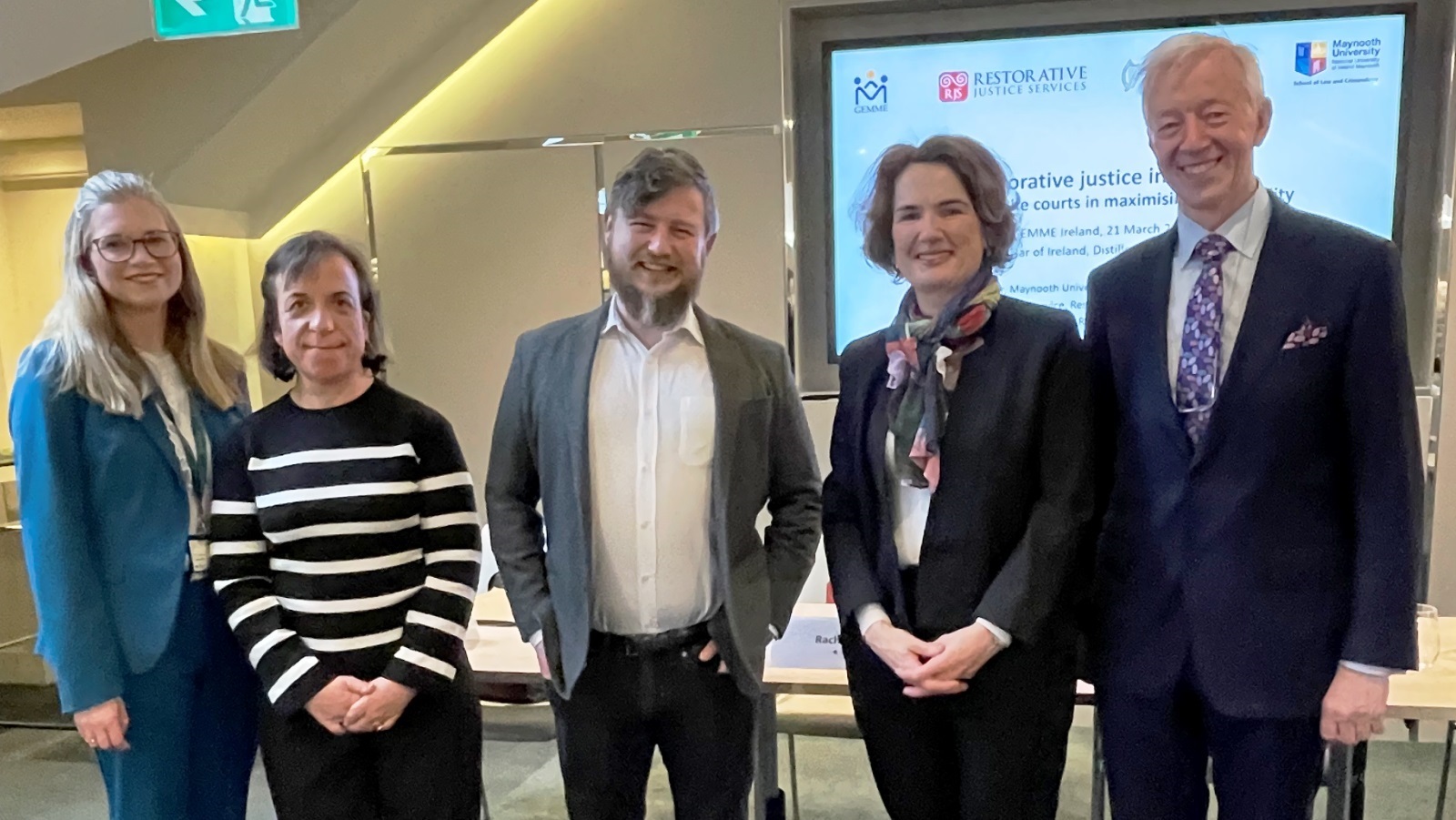GEMME Ireland hosted an in person and online event at The Bar of Ireland on Thursday 21st March 2024. The event was of interest to members of the judiciary and court actors who wish to better understand the benefits and process of restorative justice and its relationship with court.
"Restorative justice in Ireland: The role of the courts in maximising accessibility" was chaired by His Honour Judge Paul Kelly, President of the District Court. Ms Justice Marguerite Bolger, Chairperson, GEMME Ireland, will welcome all to the event.
This event explored the role of the judiciary in maximising the accessibility of restorative justice, in accordance with European and Irish law.
First, Dr Ian Marder (Maynooth University, School of Law and Criminology) explored the legal framework and international research on access to restorative justice. This part will consider the meaning of accessibility in law and the research on the referral and assessment process, as well as the types of cases where there is the highest potential benefit of enabling restorative justice, and the importance of RJ services having full access to victim information.
Second, Rachel Lillis (Probation Service, Restorative Justice and Victim Services Unit) and Emeline Le Prince (Restorative Justice Services) discussed each of these issues in an Irish context. Their part of the presentation clarified the models of restorative justice available in Ireland, the process by which the judiciary can refer cases, and the importance of restorative justice accessibility. They presented several real-life cases to illustrate the benefits and procedures of different restorative justice models, including in cases where there is or is not a direct victim of the offence.
Biographical Notes on Speakers

Rachel Lillis, Assistant Principal Probation Officer, Probation Service. Rachel is a CORU registered social worker with over 20 years of experience in a variety of community and custodial settings. Rachel has lead responsibility for the Restorative Justice and Victim Services Unit, which provides leadership and support for the consistent and integrated provision of a range of RJ models and oversees engagement and support to victims of crime. Rachel also holds the brief for a newly established Social Inclusion and Reintegration Unit.

Dr Ian Marder is Assistant Professor in Criminology and Co-Deputy Director of the Centre for Criminology at Maynooth University School of Law and Criminology. His research and policy and practice development work focuses on the development of restorative justice and restorative practices in criminal justice processes in Ireland and across Europe.
 Emeline Le Prince is the Service Manager in Dublin Restorative Justice Services which is a non-for-profit organisation that works restoratively with people affected by crime. In partnership with its stakeholders the Service offer restorative programmes that focus on meeting the needs of victims of crime whilst challenging the behaviour of those who
Emeline Le Prince is the Service Manager in Dublin Restorative Justice Services which is a non-for-profit organisation that works restoratively with people affected by crime. In partnership with its stakeholders the Service offer restorative programmes that focus on meeting the needs of victims of crime whilst challenging the behaviour of those who



5 thoughts on “Recording of the event “Restorative justice in Ireland: The role of the courts in maximising access””
The seminar held on Thursday March 21st at the Gaffney Room was informative and very worthwhile. My thanks to all.
Is there an appropriate forum to address issues of a critical nature without appearing to seek to undermine the trojan work undertaken by GEMME ?
Dear Vincent, thank you very much for your comment.
You can address your questions to info@gemmeireland.ie
Regards.
My very sincere thanks to everyone involved for organising, facilitating and delivering this very interesting and thought provoking presentation. The very flexibility of the approach discussed provides significant opportunities’ for the victims of crime, to gain insights and hopefully closure. Equally one would hope that the perpetrators of crime will better come to understand the adverse impact of poor decision making and through improved decision making in the future, reduce recidivism.
Thank you very much for your kind comment.